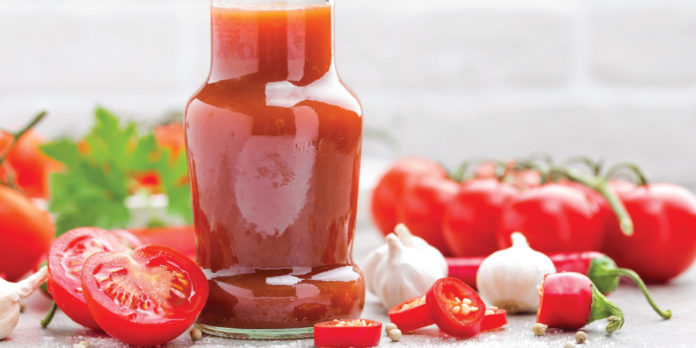Adventurous foodies are looking for new and exotic foods. Priyanka Jethwa explores the condiments that will help you meet their needs.
As our desire to travel grows, our appetite for new recipes and flavours does, too. New, imported and exotic foods are more in demand than ever. Not long ago, Huy Fong Foods’ Sriracha Hot Chili Sauce boomed across the UK food market. The Asian-inspired US sensation attracted the attention of condiment giant Kraft Heinz, which added a Sriracha variety to its portfolio, and inspired reality TV star and millennial influencer Kylie Jenner to Instagram a picture while wearing the distinctive Sriracha brand colours.
A general trend towards premiumisation remains in vogue, meanwhile. Across all categories in wholesale, consumers are demanding ‘more’ from the products they purchase. Kantar Worldpanel data indicates that while chilli and Tabasco sauces have grown in volume by 8.7% year-on-year, ketchup sales have slipped 4.2%.
Therefore, to keep your condiments range fresh and on-trend, you need to find that sweet spot between new and exotic and traditional and familiar, in order to ensure you and your customers enjoy the biggest possible profit.
When spicy met saucy
Analyst Euromonitor International says interest in spicy foods has been generated by popular TV shows such as Man v Food, encouraging the emergence of food challenges across the UK. This development has helped chilli sauces surge in popularity, especially among younger consumers.
This fad is not likely to dwindle any time soon. Sheila Delaney, business development manager at Birmingham-based wholesaler SK Food and Drinks, says that despite stocking only 20 condiment stock-keeping units (SKUs), the business has seen an increasing interest in world sauces. Popular flavours include chilli, Tabasco and Jamaican-inspired varieties. Regarding specific brands, Delaney points to having seen a surge in sales of Nando’s, Maggi and Amoy.
Mimi Williams, brand manager at Amoy, says customers are returning from exotic countries and visiting the UK’s growing number of Asian restaurants, inspiring them to replicate at home what they have eaten abroad or in restaurants. Williams notes that 17% are actively looking to try new and inventive Asian food.
Delaney adds: “We also sell a lot of Jamaican-inspired, barbecue and smokey varieties, evenly split between retail and catering. As we have a diverse culture in the city centre, we have to provide tastes to accommodate.”
This noticeable interest in Caribbean-inspired flavours has also been witnessed by Wanis International Foods, a leading wholesaler of world foods. Stocking more than 200 SKUs from around the globe, the wholesaler says Caribbean sauces are continuing to deliver double-digit growth as more and more consumers are exposed to the flavours abroad or in the out-of-home channel.
Alam Ameer, associate director at Wanis, says: “Spicier sauces have always done very well, especially East Asian and Caribbean sauces. But the past decade has been transformational for international foods and flavours.
“Condiments have played an important part in offering an easy-access route for consumers looking to experiment with more exotic flavours.”
Ameer notes that the category has a loyal following among core shoppers, including minority ethnic communities with a cultural connection to specific foods and flavours, as well as adventurous foodies. However, he explains that the continued growth is coming from new shoppers who are more willing to try something different, which has shifted the once-niche category into the mainstream.
Trade up from traditional
But while spicy succeeds, there has been a noticeable decline in traditional varieties of ketchup, mayonnaise and mustard, says SK’s Delaney. Furthermore, Wanis’ Ameer reports that his business is seeing a slowdown in sales of sauces such as salad cream.
“This could be due in part to the sheer amount of choice available,” he says. “People are experimenting more, and lines such as Sriracha, sweet chilli sauce and barbecue are mainstays in a consumer’s choice of take-home condiments.”
Jag Singh, brand manager at world foods brand Tropical Sun Foods, says spicy and international-inspired savoury condiments have become mainstays in many UK households, with such products now merchandised among their mainstream counterparts, further driving purchases.
Singh notes: “Wholesalers have a great opportunity to tap into this trend by offering fast-moving lines, such as Jerk BBQ Sauce and West Indian Hot Pepper Sauce, to help retailers deliver incremental sales, especially since authentic world foods lines can command a premium.”
Branded goods
When it comes to pitting brand against own-label, branded tends to succeed, as consumers are more likely to trust products that they have tried before – especially those who want to try new flavours. Therefore, stocking a range that focuses on branded goods is a sure-fire way to guarantee sales of new products.
Ameer adds that Wanis represents brands such as Baron Foods from St Lucia, Chief Brand Products from Trinidad and Tropical Sun, all of which are brands well-known among core ethnic shoppers who have used its products for years.
“We are seeing them now cross over to mainstream shoppers, who are also looking for retailers to offer products that are not just a hot sauce ‘gimmick’ but offer authentic flavours,” he says.
Of course, ketchup and mayonnaise both still command a very strong place in your condiments range. But to drive greater margins in this category, you need to tap into exotic tastes and flavours, and not be afraid of trying something new.








